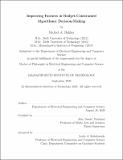Improving fairness in budget-constrained algorithmic decision-making
Author(s)
Bakker, Michiel Anton.
Download1227516134-MIT.pdf (5.330Mb)
Other Contributors
Massachusetts Institute of Technology. Department of Electrical Engineering and Computer Science.
Advisor
Alex 'Sandy' Pentland.
Terms of use
Metadata
Show full item recordAbstract
The last five years have seen a vast increase in academic and popular interest in "fair" machine learning. But while the community has made significant progress towards developing algorithmic interventions to mitigate unfairness, research has focused predominantly on static classification settings. Real-world algorithmic decision making, however, increasingly happens in more dynamic settings. In this thesis, we will study fairness in some of these settings. The first part focuses on mitigating unfairness in settings in which decision makers can choose to spend part of a limited budget on acquiring more information for individuals. For example, a doctor who is unsure about a diagnosis can first decide to conduct additional tests before making a final decision. Studying fairness in this budget-constrained decision-making setting is important not only because of its applicability to a wide range of domains but also because it offers a novel perspective on how fairness can be defined and improved. We will propose three methods for achieving fairness in this setting that provide guarantees at the level of a population subgroup or at the level of an individual. The second part of the thesis studies a real-world budget-constrained application of algorithmic decision-making. We detect bias in statistical models that are currently deployed to support the distribution of social programs among millions of households in the developing world. Finally, we propose a domain-specific decision support tool that addresses bias in this domain while accounting for the complex multi-stakeholder decision-making process.
Description
Thesis: Ph. D., Massachusetts Institute of Technology, Department of Electrical Engineering and Computer Science, September, 2020 Cataloged from student-submitted PDF of thesis. Includes bibliographical references (pages 143-153).
Date issued
2020Department
Massachusetts Institute of Technology. Department of Electrical Engineering and Computer SciencePublisher
Massachusetts Institute of Technology
Keywords
Electrical Engineering and Computer Science.